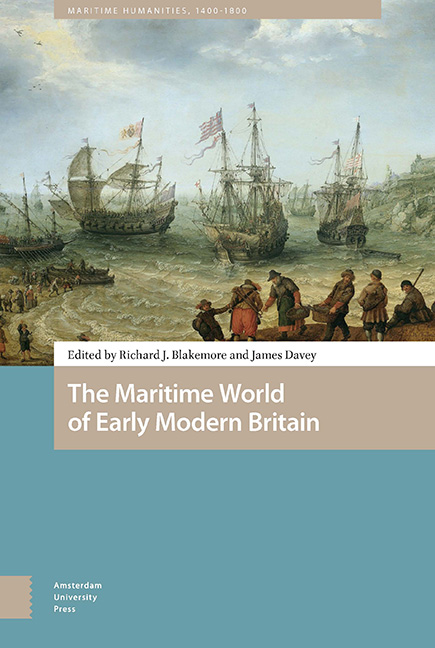Book contents
- Frontmatter
- Contents
- List of illustartions
- Acknowledgements
- Note on Conventions and Terminology
- Introduction
- 1 The Minion and Its Travels: Sailing to Guinea in the Sixteenth Century
- 2 Commanding the World Itself : Sir Walter Ralegh, La Popelinière, and the Huguenot Influence on Early English Sea Power
- 3 An Investigation of the Size and Geographical Distribution of the English, Welsh, and Channel Islands Merchant Fleet: A Case Study of 1571–72
- 4 An Evaluation of Scottish Trade with Iberia during the Anglo-Spanish War, 1585-1604
- 5 Performing ‘Water’ Ralegh : The Cultural Politics of Sea Captains in Late Elizabethan and Jacobean Drama
- 6 ‘Wicked Actions Merit Fearful Judgments’ : Capital Trials aboard the Early East India Company Voyages
- 7 A water bawdy house’: Women and the Navy in the British Civil Wars
- 8 ‘Thy sceptre to a trident change / And straight , unruly seas thou canst command’: Contemporary Representations of King Charles I and the Ship Money Fleets within the Cultural Imagination of Caroline England
- 9 ‘Proud Symbols of the Prospering Rural Seamen’ : Scottish Church Ship Models and the Shipmaster’s Societies of North East Scotland in the Late 17th Century
- 10 Systematizing the Sea : Knowledge, Power and Maritime Sovereignty in Late Seventeenth-Century Science
- Select Bibliography
- About the Contributors
- Index
10 - Systematizing the Sea : Knowledge, Power and Maritime Sovereignty in Late Seventeenth-Century Science
Published online by Cambridge University Press: 21 November 2020
- Frontmatter
- Contents
- List of illustartions
- Acknowledgements
- Note on Conventions and Terminology
- Introduction
- 1 The Minion and Its Travels: Sailing to Guinea in the Sixteenth Century
- 2 Commanding the World Itself : Sir Walter Ralegh, La Popelinière, and the Huguenot Influence on Early English Sea Power
- 3 An Investigation of the Size and Geographical Distribution of the English, Welsh, and Channel Islands Merchant Fleet: A Case Study of 1571–72
- 4 An Evaluation of Scottish Trade with Iberia during the Anglo-Spanish War, 1585-1604
- 5 Performing ‘Water’ Ralegh : The Cultural Politics of Sea Captains in Late Elizabethan and Jacobean Drama
- 6 ‘Wicked Actions Merit Fearful Judgments’ : Capital Trials aboard the Early East India Company Voyages
- 7 A water bawdy house’: Women and the Navy in the British Civil Wars
- 8 ‘Thy sceptre to a trident change / And straight , unruly seas thou canst command’: Contemporary Representations of King Charles I and the Ship Money Fleets within the Cultural Imagination of Caroline England
- 9 ‘Proud Symbols of the Prospering Rural Seamen’ : Scottish Church Ship Models and the Shipmaster’s Societies of North East Scotland in the Late 17th Century
- 10 Systematizing the Sea : Knowledge, Power and Maritime Sovereignty in Late Seventeenth-Century Science
- Select Bibliography
- About the Contributors
- Index
Summary
For early modern historians, the frontispiece of Francis Bacon's Instauratio Magna (Fig. 10.1) has become a symbol for the joint ventures of knowledge and travel in this period. Depicting a large galleon ship sailing beyond the Pillars of Hercules, it represented human advance beyond the boundaries of the known world, buttressed by the phrase from the Book of Daniel: Multi pertransibunt & augebitur scientia (‘Many will travel and knowledge will be increased’). This same rhetoric was carried forth into the Royal Society of London, where Bacon's works were said to have acted as a ‘prophetic scheme’. Indeed, John Evelyn sketched a design for the Society's new motto and coat of arms that was strikingly similar to Bacon's frontispiece: a ship sailing on the water with the inscription ‘Et Augebitur Scientia’. As well as gesturing towards the Society's Baconian lineage, Evelyn's ship further cemented the links between the maritime world and the increase of knowledge. Yet the connections between knowledge and travel went beyond the will to know and discover, by implying the will to conquer too. As Robert Iliffe has shown, the early fellows of the Royal Society envisioned an experimental philosophy that was ‘peculiarly English’, seeking to create a philosophical empire centred in London where ‘there will scarce be a Ship come up the Thames, that does not make some return of Experiments as well as Merchandize’. Thomas Sprat's History of the Royal Society (1667), an apologist account of the Society's early years, cast England's empire as ‘the greatest that ever commanded the ocean’, rendering it ‘not only mistress of the ocean, but the most proper seat for the advancement of knowledge.’ Empire denoted supreme command over a domain, but this could be territorial or conceptual, over land as well as knowledge. Science and empire were, in this regard, wedded together, with the Royal Society's second charter explicitly stating their intention ‘to extend not only the boundaries of Empire, but also the very arts and sciences.’
The connections between science and empire were rooted in shared notions of power, for both were projects with an aspiration to human dominion. As Sarah Irving has argued, the recovery of man's prelapsarian empire over nature and the expansion of English territorial empire were regarded, in the minds of some experimental philosophers, as part of the same enterprise.
- Type
- Chapter
- Information
- Maritime World of Early Modern Britain , pp. 257 - 282Publisher: Amsterdam University PressPrint publication year: 2020



